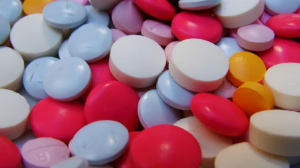Beyond the Gym: Anabolic Steroids and Their Impact on Mental Health
Introduction
Anabolic steroids have long been associated with the world of athletics and bodybuilding. While many perceive them as merely performance-enhancing substances, their far-reaching implications extend beyond the physical sphere. In recent years, there has been a growing awareness of the psychological and emotional consequences of anabolic steroid use. This article delves into the complex relationships between anabolic steroids and mental health, exploring the nuances that surround these substances in modern society.
Understanding Anabolic Steroids
Anabolic steroids, or anabolic-androgenic steroids (AAS), are synthetic derivatives of testosterone. They are primarily used to promote muscle growth and enhance physical performance. Athletes and bodybuilders often use them to gain a competitive edge, while some individuals may use them for cosmetic reasons, such as enhancing physique or self-esteem. The appeal is understandable: increased muscle mass, improved recovery times, and heightened endurance are alluring benefits.
Types of Anabolic Steroids
Anabolic steroids come in various forms, including oral tablets, injections, and topical gels. They can be classified into two categories: anabolic steroids, which promote muscle growth, and androgenic steroids, which influence male traits. It is important to note that the substances are often used in combination, commonly referred to as “stacking,” to maximize their effects.
The Mental Health Landscape
While the physical effects of anabolic steroids are well-documented, their impact on mental health is less understood. Mental health encompasses emotional, psychological, and social well-being, influencing how individuals think, feel, and behave. Disorders like anxiety, depression, and aggression have been linked to steroid use, raising questions about the psychological costs of these substances.
The Connection Between Steroids and Mood Disorders
Several studies indicate a correlation between anabolic steroid use and mood disorders. Users may experience mood swings, irritability, and aggressive behavior, commonly referred to as “roid rage.” This phenomenon has been recognized in both anecdotal and scientific literature.
-
Mood Swings: Many users report that their moods can shift dramatically, with periods of euphoria followed by depressive episodes. A study published in Psychosomatic Medicine indicated that a significant percentage of steroid users experienced mood disorders, particularly depression and anxiety, post-use.
-
Aggression: Numerous reports highlight the potential for increased aggression among steroid users. The Journal of Clinical Psychiatry found that individuals using anabolic steroids displayed higher levels of hostility and aggression compared to non-users.
-
Depression: After discontinuing steroid use, many individuals experience withdrawal symptoms akin to those seen in substance dependence. This can lead to severe depression and anxiety, which may require treatment.
Biological Mechanisms at Play
The relationship between anabolic steroids and mental health can be partly explained through biological mechanisms. Anabolic steroids influence neurotransmitter systems in the brain, particularly those associated with mood regulation.
Neurotransmitter Alteration
Anabolic steroids affect levels of neurotransmitters such as serotonin and dopamine—two chemicals intimately linked to mood regulation. When testosterone levels increase due to steroid use, they can lead to an overproduction of these neurotransmitters, resulting in temporary euphoria. However, this balance may shift, resulting in depressive symptoms once the steroids are discontinued.
Hormonal Fluctuations
The body’s endocrine system is designed to maintain hormonal balance. Introducing anabolic steroids disrupts this balance, leading to various hormonal fluctuations that can adversely affect mental health. The body may reduce its natural production of testosterone during steroid use, leading to a state known as “hypogonadism,” which manifests as depressive symptoms, fatigue, and diminished libido.
The Impact on Self-Image and Identity
Beyond the biochemical changes, anabolic steroids profoundly affect self-image and personal identity. Many individuals turn to steroids out of dissatisfaction with their physical appearance or self-worth issues. This relationship can create a slippery slope toward mental health disorders.
Body Dysmorphic Disorder
Body Dysmorphic Disorder (BDD) is a condition where individuals become preoccupied with perceived flaws in their appearance. Anabolic steroids can exacerbate these feelings, leading individuals to pursue further enhancements despite already significant progress. Research suggests a strong link between BDD and the use of anabolic steroids, particularly among young men.
Identity Issues
For some, the use of anabolic steroids becomes a defining aspect of their identity. This can lead to a cycle of dependency, where users feel that their self-worth is tied to their physical appearance and performance. This connection can heighten feelings of anxiety and depression, especially if users face societal or internal pressures related to body image.
Social Implications of Anabolic Steroid Use
The social consequences of anabolic steroid abuse further complicate the mental health landscape. Societal norms around body image, masculinity, and competition heavily influence an individual’s choice to pursue steroid use, fostering environments that can contribute to mental health issues.
The Role of Peer Pressure
In competitive sports and gym culture, the pressure to perform can be immense. This environment often normalizes steroid use and discourages conversations about the mental health impact. Young athletes may feel compelled to use steroids not just for performance, but to fit in or achieve societal expectations.
Stigma Surrounding Mental Health
Despite increasing awareness, stigma surrounding mental health persists, especially in certain populations, including athletes. Many steroid users fear being judged or ostracized for seeking help with their mental health, perpetuating a cycle of silence and suffering.
Case Studies
A Case of “Roid Rage”
One widely publicized incident involved a professional athlete who, during a period of steroid use, exhibited extreme aggression resulting in criminal behavior. Following intervention and therapy, the athlete reported a significant improvement in mental health, attributing the change to cessation of steroid use and professional help.
Anxiety and Depression in Bodybuilders
Another case involved a group of amateur bodybuilders who began using anabolic steroids in pursuit of enhanced physiques. As their usage increased, several individuals noted a decline in overall mood and increased anxiety. They later sought counseling and discussed feelings of inadequacy and depression, illustrating the psychological impact often concealed by the pursuit of physical perfection.
Limiting Damage: Strategies for Addressing Mental Health
Addressing the mental health consequences of anabolic steroid use requires comprehensive strategies that include education, counseling, and support systems.
Education and Awareness
Initiatives aimed at educating potential steroid users about the psychological risks are essential. Schools, gyms, and sports organizations should foster open discussions about the implications of steroid use, emphasizing the importance of mental health.
Counseling and Support
Access to mental health professionals who understand the complexities surrounding anabolic steroid use is crucial. Therapy focused on body image, self-esteem, and identity can help individuals navigate their feelings about performance and appearance. Support groups may also provide a platform for sharing experiences and fostering a sense of community.
Creating a Culture of Acceptance
Promoting body positivity and acceptance of diverse body types is essential in combating the cultural pressures associated with anabolic steroid use. Celebrating individual achievements unrelated to physical appearance can help shift the narrative and reduce the stigma surrounding mental health.
Conclusion
Anabolic steroids pose a complicated dilemma—while they offer physical enhancements, the mental health risks associated with their use cannot be ignored. From mood disorders to identity crises, the consequences can be far-reaching and detrimental. It is imperative that society recognizes the psychological impact of anabolic steroids, fostering an environment where mental health is prioritized. By promoting education, support systems, and a culture of acceptance, we can help mitigate the negative effects of steroid use and prioritize overall well-being.
References
[1] Psychosomatic Medicine [2] Journal of Clinical Psychiatry [3] Body Dysmorphic Disorder Literature [4] Sports Psychology StudiesBy shedding light on the intricate tapestry of anabolic steroids and mental health, we can facilitate informed decisions and promote healthier lifestyles for current and future generations.


























Add Comment